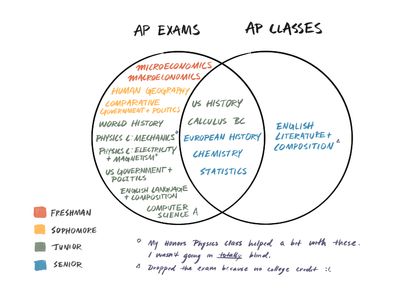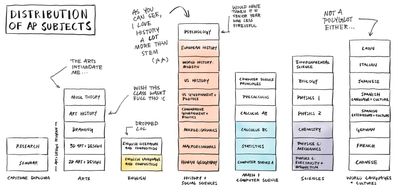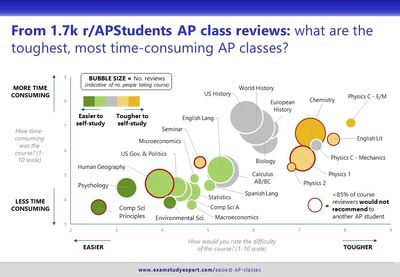Let's get the disclaimers out of the way: AP exam scores will not have a significant impact on college admissions in the US.[1] If you need to optimize for that, there are far better options. Don't sacrifice your extracurriculars or personal projects to study for the exams.
I studied for these exams because I had a lot of time over the summer. I always knew that I was going to study computer science in college, so I worried that I wouldn't have the time to really explore subjects like economics or human geography. High school is a good time to mess around with different subjects (before you have to pay thousands of dollars for the privilege). Plus, there is a high marginal return from studying different fields. Concepts like "utility" and "potential energy" are some of the most foundational ideas to come out of economics and physics, and they completely changed how I understood and modeled the world.[2] I also became significantly better at test-taking.[3]
Contents
Permalink to “Contents”The exams
Permalink to “The exams”
Because of the pandemic, I took the AP Microeconomics and AP Macroeconomics exams at home. The 2020 digital exams had an unusual format, since CollegeBoard had to adapt to pandemic health regulations. For that year, the MCQ portion was removed, and the 2-hour exams were shortened to 45 minutes. More about the 2020 AP exams controversy here. As a nervous freshman, I definitely overprepared for the exams. I took three sets of notes from Khan Academy, 5 Steps to a 5, and the Princeton Review. Then I aggregated them into a complete set of macroeconomics and microeconomics notes. I advise that you finish one prep book or online course (or my notes) and then practice the FRQs on the CollegeBoard website. It also won't hurt to read the Course and Exam Description (CED). I can also vouch that Jacob Clifford has a great review video for the entire course.
I studied for the AP Comparative Government and Politics, the AP Human Geography, and the AP World History exams in my sophomore year. AP Comparative Government and Politics became one of my favorite subjects. It is known as an "easy" AP, but I found it was quite challenging. Although the course is ostensibly about government structures and current events, you also need to understand the history of the six listed countries. I started with AP Comparative Government and Politics: An Essential Coursebook by Ethel Woods. The coursebook was interesting, but I don't recommend it if you are pressed for time. It'll teach you about government and politics (and military history and economics), but it won't help you compare the countries. Later I supplemented it with the Barron's prep book, which I don't have much to say about. Instead, I strongly recommend watching the AP videos. The videos emphasize the connections you can make about the countries, and they contain plenty of helpful diagrams too. (By the time I took the exam, I had 109 slides with screenshots from the videos.)
AP Human Geography is also known as an "easy" AP. Although the exam is fairly easy to pass, I think that the subject is quite deep and interesting. Human geography combines a bit of everything, from geopolitics to economics and human development. You don't need to know everything about something specific, but you do need to know something specific about everything. I started off by reading the Barron's prep book, but I think the Crash Course prep book was better. It has many diagrams, charts, and specific examples that I copied into my notes. And Mr. Sinn's videos covered units 5-7—which were about land-use and economic development patterns—exceptionally well. I also strongly recommend reading through the scoring guidelines for the FRQs because the questions tend to be very broad and there are a variety of different acceptable responses. Unfortunately I don't have a lot of advice for the MCQs, which are much harder to prepare for than the FRQs. Unlike what you might find in your prep books, the questions will all be stimulus-based, and you'll just have to go with your gut feeling.[4]
I couldn't find a testing center to take the AP World History exam in my sophomore year, so I took it in junior year instead. I relied on the Barron's prep book, which had more than enough content. My notes grew incredibly long. I also made a spreadsheet of the past FRQ topics, which was surprisingly helpful for predicting FRQ topics. (The CollegeBoard seems to really like the Mongols and the Green Revolution.)
While I did not have daily homework for my AP US History class, I did type up 31 chapter outlines from the The American People: Creating a Nation and a Society by Nash. Not that I can really recommend that book to you guys; it has a lot of fluff and doesn't get to the point fast enough. Maybe read it to get a vibe of the time period?[5] I also made a very condensed spreadsheet timeline which summarizes the information in the presidents guide. The exam that I took appeared to focus on first-semester topics, so I would review the first half of the course more thoroughly than the last half.
As for AP Calculus BC, I would recommend reading through any textbook. My preference is Larson's Calculus of a Single Variable. The graphics are helpful, and he has a good selection of example problems for each section. There are also full solutions to select exercises on CalcChat. Note that the textbook contains excess content that's not covered on the AP exam, like Newton's Law, hyperbolic functions, and Simpson's Rule. Read the CED thoroughly if you need clarification on what's covered. When I really didn't understand a subject, I went through the examples on Paul's Online Notes. As always, remember to practice through the released MCQs and FRQs too. Mr. Calculus has rare MCQ solutions on his site, but you'll have to look elsewhere for the questions.[6]
Our school doesn't offer the AP English Language and Composition class, but many Honors American Literature (HAmLit) students take the exam. My best advice for preparing for the exam is to read several released FRQs and figure out how they won (or lost) points. I find it pretty easy to replicate a "good" essay, especially on a formulaic exam like this.
My school only offers Honors Physics, but I took both the AP Physics C: Mechanics exam and the AP Physics C: Electricity and Magnetism exam. The Honors Physics class was algebra-based and covered around 50% of mechanics and 20% of electricity & magnetism. To be honest, I have no clue how I passed those exams, since I didn't... learn the material. There is probably a huge marginal return from reading Jansen's study guide and finishing the MIT workbooks for mechanics and E&M. I didn't read a textbook or watch many videos, but you probably should if you have the time. I personally like Viren's videos, but my friends swear by Flipping Physics. Since I was on a time crunch, I moved on to reviewing released FRQs right after finishing the workbooks. I couldn't correctly solve a majority of the problems, but I feel like I benefited a lot just from reading the solutions. (I also stared at this Gauss' Law guide for ages.)
For the AP Computer Science A exam, I primarily used CSAwesome. If you have experience in programming, you can basically skip most of the exercises (especially the turtle problems and the labs). Just make sure you master the syntax and the object-oriented concepts (inheritance, superclasses & subclasses, and polymorphism). I ended up with around 7 pages of scrambled notes on the trickier parts of the language. Melody's FAQ guide was extremely helpful for understanding the format of the exam. While you should definitely read through at least one of the released FRQ solutions, you might want to focus on prepping for the MCQ section; I personally found that more difficult. A spreadsheet of the past FRQ topics can be found here.
Oh, and I also took the AP US Government and Politics exam. To prepare, I completed the Khan Academy course and then read the CED from top to bottom. Feel free to use my regular notes or my court cases cheatsheet. I also did like 7 sets of FRQs for practice, but that was definitely an overkill. I think that the only thing you have to be concerned about is the details of all of the court cases, since you have to write an essay on a random one during the test.
Finally, we are on to senior year! I didn't self-study any exams this year, but I did take four AP classes: AP Statistics, AP Chemistry, AP English Literature and Composition, and AP European History. My AP Statistics class relied on the textbook The Practice of Statistics by Starnes and Tabor, which directly follows the AP exam curriculum. There's a lot of fluff in it, but the section summaries and practice AP exams are very helpful. I wouldn't recommend using any of the cheat sheets online, since each of them proposes different rules for inference. This is a very "game-able" exam, so I would just read the released FRQs.
My AP Chemistry teacher is a member of the AP Chemistry Teachers Facebook Group, so she used a lot of the free materials teachers posted there instead of the textbook. I would recommend Emily Miller's "I Do, We Do, You Do" worksheets if you can get your hands on those. Otherwise, the AP Daily videos are also quite good.
My AP European History teacher assigned "study guide" questions and vocabulary from A History of Western Society by McKay. Like most history books, A History is very dense and has poor pacing. But it does have highlighted vocabulary words, unlike the APUSH textbook I mentioned earlier. To grasp the key points of the course, you should read the CED thoroughly. The MCQs are quite difficult, but there isn't much that you can do to prepare for it other than master the content. The FRQs are also difficult, but you can prepare by reading through the released FRQs (I keep recommending that for all these exams, so you should REALLY do this). Also try to remember the important dates.
I dropped the AP English Literature and Composition exam, since my college doesn't accept credit for it at all.
FAQs
Permalink to “FAQs”How do I self-study for AP exams?
Permalink to “How do I self-study for AP exams?”Read the CED, skim over the content, and read many released MCQs and FRQs.
It sounds easy, but many students don't do this. They don't pay attention to the CED. They spend most of their time rereading their prep books, making interesting Java mods, or deep-diving through Wikipedia. That might be fun, and they will probably learn a lot about the subject by doing those types of things. But they won't get a better score on the AP exam.
What are the easiest APs to take?
Permalink to “What are the easiest APs to take?”Depends on your interest and aptitude for the subjects. I mean, I walked out of the AP Calculus BC exam room feelin' on top of the world, and the next day I stumbled out of the AP U.S. Government and Politics gym with a massive headache. (I forgot the details of the court cases for the last FRQ question.) So YMMV, genuinely. Here were the subjects I focused on:

But if you really want an "actual" answer, here's a lovely survey done by the folks at r/APStudents a few years back.

Should I take the AP exam without taking the AP class?
Permalink to “Should I take the AP exam without taking the AP class?”Probably not. I think there is a lot of value that comes from interacting with your teachers and classmates. Yeah, you can probably master U.S. History and Chemistry by yourself, but you'll miss out on Traditions™ like the Jefferson vs. Hamilton debates or the ice cream-making final. My advice is to check whether the AP teacher for that class is hilarious before you decide to forego their class. Some notable quotes from my teacher [REDACTED]:
For those of you whose goals are Berkeley, this could be your future. Just remember that Berkeley smells like pee.
I wonder why no one’s yelling about Theodore Roosevelt having a giant penis cannon.
I hope we have a war with Russia. That’d be cool. It’ll give us something to talk about.
You know how sometimes during football season the world just stops because they all want to watch grown men in tights touch each other?
Are you trying to build a chair in my room? Stop! Sit down and learn something!
I know from personal experience that killing people does not make them like you.
I wish I slept with my parent’s hot friend’s wife.
What should I do if my school doesn't offer an AP exam that I want to take?
Permalink to “What should I do if my school doesn't offer an AP exam that I want to take?”First, double-check with your school first. Some schools don't offer the class but will administer the exam for you guys.
If that doesn't work, cold-email the surrounding schools. Some schools have a designated AP Coordinator, but the secretary works just as fine. You'll get a lot of rejections and nonresponses, but you'll also get a lot better at handling rejections and nonresponses. I must've sent around 80 emails total in my freshman and sophomore year.
Resources
Permalink to “Resources”| Exam | Resources |
|---|---|
| Comparative Government and Politics | AP Daily videos |
| Human Geography | Mr. Sinn's videos |
| Macroeconomics | Notes Khan Academy Jacob Clifford's videos |
| Microeconomics | Notes Khan Academy Jacob Clifford's videos |
| World History | Notes Past FRQ topics |
| European History | |
| United States History | American Presidents cram guide Timeline |
| US Government and Politics | Notes Court cases cheatsheet Khan Academy |
| Calculus BC | Calculus of a Single Variable by Ron Larson Paul's Online Notes Mr. Calculus's MCQ solutions |
| Statistics | The Practice of Statistics by Starnes and Tabor |
| Computer Science A | CSAwesome Melody's FAQ guide Past FRQ topics |
| Physics C: Mechanics | MIT Workbook Jansen's study guide Viren's videos Flipping Physics Past FRQ Topics |
| Physics C: Electricity and Magnetism | MIT Workbook Jansen's study guide Viren's videos Flipping Physics Past FRQ Topics |
| Chemistry | AP Daily videos IDYDWD worksheets |
| English Language and Composition | None |
| English Literature and Composition | None |
One of my friends received a conditional offer letter from a school in the UK; they said that her acceptance was contingent on her receiving 5s in four AP subjects. What a stressful senior year. ↩︎
I also came out of this experience with excessive confidence and extreme autodidactic tendencies. To name a few experiences, one of my friends canceled his AP Physics C scores right after taking the exam. Neither of us were confident after taking the exams, but I knew that he was slightly better at physics than I was. On the exam, I left half of the FRQs blank and guessed on the other half, and I'm not even exaggerating. I didn't cancel my scores, and I thought it was silly of him to do so before he even knew what they were. He paid the fee and took the exam; he should follow through. If the scores were poor, no one had to know about them. Perhaps the only thing in his way was that he did not want to acknowledge his failure. At the end of the day, I received 5s on both physics exams, and we'll never know what he would've gotten. (On the other hand, I stopped paying attention to my teachers because I thought that I could be more productive on my computer. Maybe I was. But I think I missed out on talking to my teachers, which is arguably more important.) ↩︎
Once I had to take 3 AP exams in one sitting. That was crazy. ↩︎
Let's just say that the human geography MCQs on the online exam were absurdly hard. One of the stimuli was a very blurry picture of the Nile River, not that I knew that at the time. ↩︎
Out of curiosity, I looked through the other APUSH textbooks recommended by CollegeBoard. Around 25% of them (5/21) have titles referencing the Enlightenment, which is kind of interesting. ↩︎
As they say, everything is on the internet... ↩︎